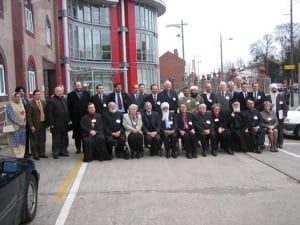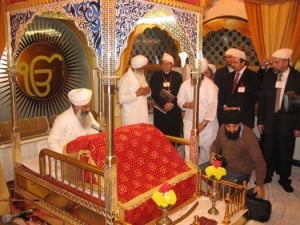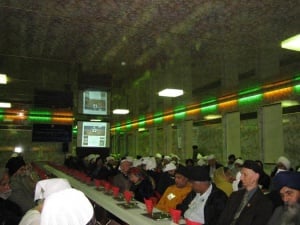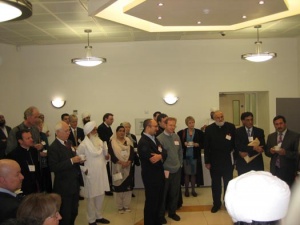ECRL and the Sikhs
London: February 2007
European Council of Religious Leaders (ECRL) and Religions for Peace is an important organisation based in Europe involved in Interfaith dialogue. It is a body of over 30 senior religious leaders of Europe's historic religions including Christianity, Judaism, and Islam, with Buddhists, Hindus, Sikhs and Zoroastrians who have committed themselves to cooperating for conflict prevention, peaceful co-existence and reconciliation. ECRL is a participating body of the World Conference of Religions for Peace.
The ECRL held an Inter Faith Conference at Guru Nanak Nishkam Sevak Jatha Gurdwara in Birmingham which was hosted by Bhai Sahib Mohinder Singh, Chairman of GNNSJ. The conference was held over three days from 12 to 14 February 2007 and discussed various issues of importance to Europe including: Religion in the public sphere, religion in education, how to achieve community cohesion and build bridges between faith communities and wider society.
The meeting has been looking at the situation facing Muslims in Britain through four focused presentations; “Muslims in Britain, what’s the problem”, “terror and fear”, “religion and education” and “religion and the public sphere”. The meeting was hosted by the Sikh community of Birmingham, and the council was also invited to visit a local Hindu temple. The council approved a new constitution and bylaws, and issued a final statement summarizing the essential points from the discussions which followed the presentations.
Before the formalities began, over 25 prominent religious leaders from Europe toured the Gurdwara's Darbar Hall where prayers were said for the success of the delegation's noble mission. Following this the delegation partook in Langar, many for the first time. They were impressed with the warmth and hospitality of the Gurdwara Sevadars.
Global religious tensions should be tackled at a local level, an MP said in Birmingham today.
John Battle, the Prime Minister’s faith envoy, said the religious challenges facing the world were now evident in neighbourhoods across the UK.
Speaking before a major faith conference in Handsworth, Mr Battle said religious groups needed to accept each other in order to live together side by side.
He said: "The tensions need to be sorted out in our neighbourhoods. The real challenges around the globe are now local.
"People need to get out more and speak to their neighbours and get to know them - learn about their religion and where they come from. There is no excuse for ignorance."
Mr Battle, MP for Leeds West, said the UK had become more like a secular society, with many people struggling to find values of any religion.
He said: "There is a search for religious values to see if they can be counted in to positively contribute answers to the challenges we face."
Today’s conference, of the European Council of Religious Leaders (ECRL), will hear from the continent’s top faith leaders.
It aims to tackle the challenges facing Muslims living in Britain, including the threat of extremism and terrorism.
Ata’ullah Siddiqui, co-chair of the Christian Muslim Forum, said extremism and terrorism were issues that needed to be addressed by all faiths.
He said: "It is not simply a Muslim issue. It has to be resolved by all faiths. The causes of terrorism and extremism need to be addressed."
He said one way to help resolve the issue is to encourage young people of all faiths to meet regularly, in they hope that they learn to live together.
Dr Siddiqui said: "Each religion has its own problems with its young people.
"They should have the opportunity to meet other young people of other faiths."
The ECRL conference is being held at a Sikh temple in Handsworth and is scheduled to conclude Wednesday lunchtime.
Those attending the conference include the Bishop of London, the Rt Rev Richard Chartres, the Belgian Cardinal Godfried Danneels and the Archbishop of Dublin, the Most Rev Diarmuid Martin.
There are also representatives from the Jewish, Sikh, Hindu and Buddhist communities from across Europe.
It is the first time the group has held one of its conferences in the UK.
- above article based on posting by Balraj Singh Nijjar & Birmingham Post on Sikhnet
Other Quotes
Religions for peace – challenging terrorism and extremism
The fourth meeting of European Council of Religious Leaders in Birmingham, UK.
Statement from the European Council of Religious Leaders/Religions for Peace - Birmingham, United Kingdom 12-14 February, 2007
The European Council of Religious Leaders – Religions for Peace gathered in Birmingham 12 to 14 February 2007 explored the issue of the situation of Muslims in Britain, convinced that experiences in this country have relevance for many other European contexts. Muslims are the largest religious minority in Britain, as in many other European countries. Whereas some of the challenges facing the Muslim community are unique, others are shared by all religious minorities. Our meeting was generously hosted by the Sikh community Guru Nanak Nishkam Sewak Jatha, and we also had the honour of visiting the local Hindu community. We appreciate and learn from the many local initiatives for dialogue, both formal and informal.
Developments since the terrorist attacks in London in July 2005, and the arrests of nine terrorist suspects in Birmingham at the end of January this year and their effects on community relations have formed a background for our discussions. As religious leaders we condemn any and all acts of terrorism, particularly when they are carried out in the name of religion, and we affirm the rule of law. We do not, however, accept that the actions of a few individuals be used to stigmatise an entire community.
In the wake of terrorism and allegations of terrorism follows a breakdown of trust between individuals, neighbours and communities. We have listened to Muslims who explain how they are now seen as potential terrorists even before they have the chance to present themselves. This stereotyping also spills over on other minority groups. Political leaders must not exploit these stereotypes, and they should work together with religious leaders to counter them. Politicians should also address the social, economical and political causes of extremism. The media too have a key role in countering prejudice.
The grave challenges facing us as religious leaders today require all of us to engage anew with our own religious traditions. All our religious traditions promote peaceful living, but we also recognise that they can be exploited to bring about hatred and aggression. We need to understand when this is happening, and confront those who abuse religion. We recognise an urgent need for intra-community discussions on these difficult issues.
In the Muslim community in Britain there have been calls to develop theological reflection which takes their minority situation into account as this situation often differs from the context in which most Muslim thinking first evolved. This call is relevant for all religious communities today as Europe is developing into a multiethnic and multi-religious society. We believe this can happen within any of our religious traditions without prejudice to their integrity. Secular claims that exclude the role of religion in society should be confronted.
Religious education of young people, or lack thereof, is a topic under debate in most European countries today. Whereas the time has gone for one religious community or world view to monopolise the education system, we are convinced that religion can, when properly taught, give a sense of identity and self confidence which can protect against influences of extremism. It is important that young people learn to know their own religious tradition. At the same time they need to learn about the traditions of their neighbours in order to understand the world in which they live and be able to engage meaningfully with others and respect them.
Islam’s strengthened presence in many European countries today has contributed to a renewed interest in the role and place for religion in the public space. For example, in Britain the recent debate about the veil that some Muslim women wear (niqab) has prompted discussions on religious symbols worn by any religious community. Although such debate can be healthy, we believe it should not lead to religion being forced away from the public sphere. All our religions influence the social fabric and lifestyles of our communities and therefore cannot be understood as only belonging to the private sphere.
As religious leaders we must think carefully about the role of religion in the broader society. When those who represent religions address issues that are of genuine concern to people of today, religion can and should have a healing effect. We urge both religious leaders and those representing political authorities to recognise the healing potential that religions have and to give room for that.
Assimilation or integration of migrant communities have for a long time been the expressed expectation of the majority communities; we believe it is more important to facilitate their full participation in all spheres of society. Every form of isolation and marginalisation must be avoided whether it is imposed by the majority or it is the groups’ own choice.
Our meeting in Birmingham has been a truly dialogical experience. Too often dialogue has been a banner under which a series of monologues have been held, but genuine dialogue creates an arena on which we can explore issues of the greatest importance, and thus build trust and confidence between various groups. In dialogue we should gain confidence to address the most difficult issues, and it is the only way whereby we can explore the otherness of the other. Only through recognising the other, and genuinely respecting this otherness, we can also appreciate our shared humanity.
Independent Catholic News
Birmingham: Cardinal Daneels at European religious leaders conference - 15 February 2007
Cardinal Godfried Danneels, Archbishop of Malines-Brussels, was one of the keynote speakers at the fourth European Council of Religious Leaders Conference, on the theme Muslims in Britain, held at a Sikh Gurdwara situated in Soho Road, Birmingham, from Monday 12 to today, 14 February, writes Peter Jennings.
The European Council works within the framework of the World Conference of Religions for Peace, which since 1970 has brought people together across religious boundaries including Christians, Jews and Muslims.
The first UK conference of ECRL was held in the new conference centre at the impressive Sikh Gurdwara (GNNSJ), at the invitation of Dr Bhai Sahib Mohinder Singh, its distinguished Spiritual Leader and Chairman.
Cardinal Danneels, who was appointed Archbishop of Malines-Brussels in 1979 by Pope John Paul II and given the red in February 1983, introduced the third session, Religious in the public sphere. During his paper Cardinal Danneels, who was born in June 1933, said: "It seems impossible, even pretentious, to determine and define what one might call the European genius, the European mentality, or the European sensitivity."
Archbishop Dr Anastasios of Tirana and All Albania, Head of the Holy Synod of the Albanian Orthodox Church, introduced the second session, on the complex issue, Terror and fear, that was closed to the media in order to allow a frank exchange of views. In 1992, following he fall of the Communist government, Dr Anastasios was appointed Archbishop of the newly established Albania Orthodox Church.
Imam Dr Ataullah Siddiqui, from the Islamic Foundation in Leicester, and Vice Chair of the Christian Muslim Forum, introduced the first session of the conference, Muslims in Britain - What's the problem?
The previous evening, Mr Bill Ozanne, Secretary, Commission for Inter-Religious Dialogue, in the Archdiocese of Birmingham, gave a short address, Birmingham as a Multicultural City.
Mr John Battle MP, (Leeds West since 1987), the Prime Minister's Envoy to the Faith Communities, was among the observers at the conference, meticulously organized by the Oslo, based ECRL Secretariat and assisted by the helpful and efficient volunteer members of the Gurdwara.
Meanwhile, members of the Birmingham Faith Leaders' Group, including Archbishop Vincent Nichols, sent a special message of welcome dated 12 February, to the delegates and observers attending this important conference.
The message said: "It is especially opportune that the conference, focusing on Muslims in Britain, is being held in Birmingham at this particular moment.
"As leaders from the City's faith communities we are aware of the feeling of isolation and vulnerability among many in the Muslim community, following the recent action to arrest nine men and subsequently charge six individuals, on suspicion of involvement in the planning of terrorist acts. We believe our faiths should lead to a more peaceful and stable society where all members of the community, of whatever background, can participate fully.
"We are united in supporting the police and other public authorities in the investigation of suspected plans to undermine the security of individuals and communities. We believe those investigations and resulting judicial processes should be carried through with fairness and transparency.
"Terrorist activity is about criminality and we have consistently condemned such activity and the damage it causes. We regret the sensational nature of much of the media coverage which has exacerbated the difficulties faced by local communities."
The message concluded: "In this regard, we stand together with the Muslim community of Birmingham during these difficult times. We are convinced that our faith traditions, working together, can provide an important vision for the cohesion and wellbeing of our City."
- Above section from: Independent Catholic News Source: Diocese of Birmingham




